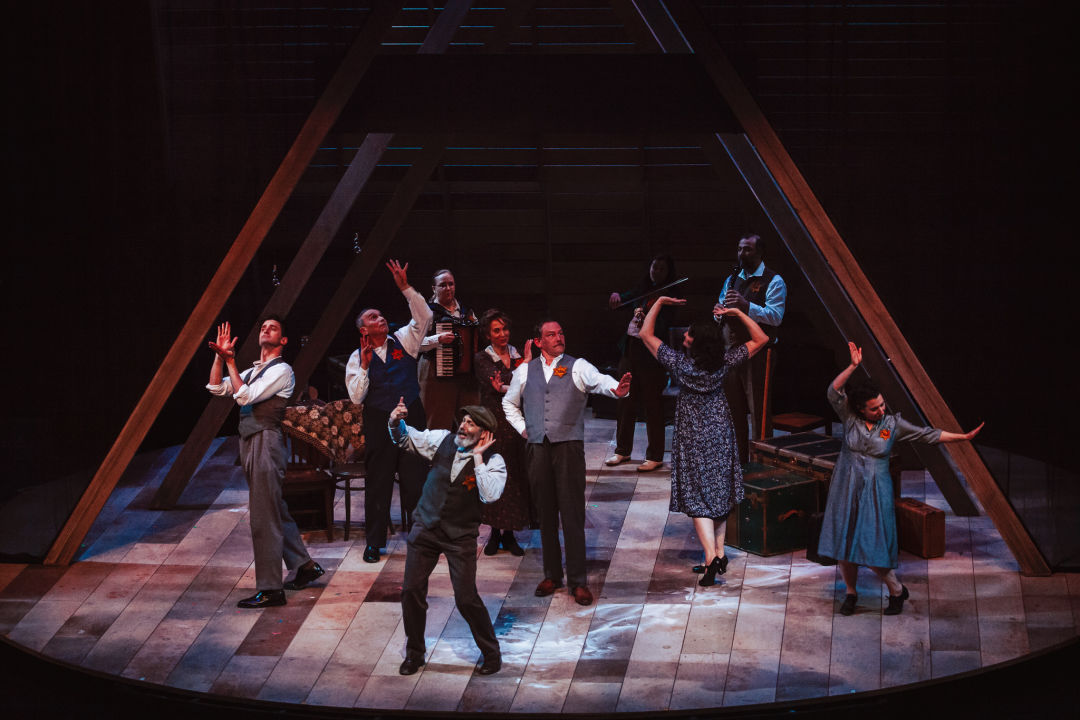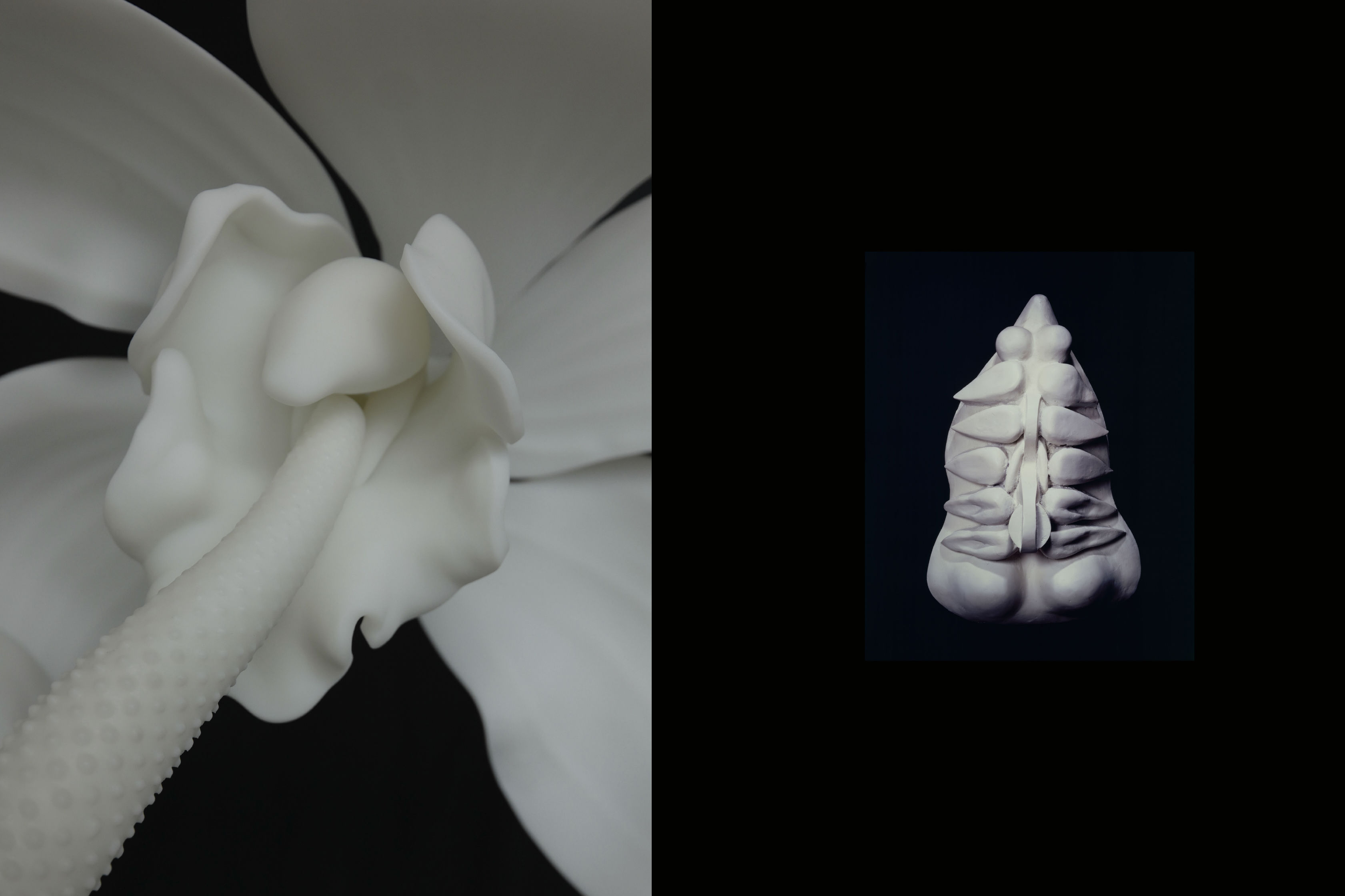Indecent Is a Moving Celebration with Some Very Pretty Pictures

The cast of Indecent
Image: Kathleen Kelly
At the top of Josh Hecht’s new production of Indecent—performed at Lincoln Hall and co-produced by Artists Rep and Profile Theatres—the show’s small ensemble lies motionless on a wooden stage. When the lights come up, the actors stand and pour dust from their clothes. A supertitle in Yiddish, then its English translation: “from ashes they rise.”
When it premiered in 2015, Indecent netted playwright Paula Vogel a place on the Pulitzer shortlist. After a decade and a half of successful shows about American fracture set during Christmas or wartime (or, in the case of 2008's Civil War Christmas, both), Vogel wasn't exactly rising from the ashes, but it did feel like she was being rewarded for returning to old fixations. In many ways, Indecent reads like a companion piece to her 1992 cult classic The Baltimore Waltz.
That play, an AIDS allegory written as an elegy for her late brother, examined the lengths we’ll go to rewrite suffering. It’s about losing someone you love and becoming so inconsolable you wear their struggle as your own. (Hecht, it's worth noting, directed an excellent production of The Baltimore Waltz for Profile earlier this season.)
Indecent, inspired by real events, is about losing whole traditions and coping by shunning whatever brought you closest to them. The action picks up in Warsaw in 1906, when novelist/poet Sholem Asch (Joshua Weinstein, more muted than he was in Hecht’s Baltimore Waltz but no less commanding) has just finished his first play, a Yiddish love story called God of Vengeance. He reads it at a salon, where his peers decry the focus on sex work and central romance between two women. It’ll be used to fan the flames of anti-Semitism, they say. “Why must every Jew onstage be a paragon?” Asch counters.
The rest of Indecent is told in vignettes. It follows the life of God of Vengeance to its 1923 Broadway premiere, when the cast was arrested for obscenity, through the holocaust and beyond. Profile/ART’s production nails the sense that time (and control) are slipping through the fingers of everyone involved—years pass in the length of a dance number, and we're constantly reminded that stories can and will gather baggage far beyond the imaginations of their tellers.
It's provocative, unwieldy material, and Hecht manages it most successfully in stage pictures. An early sequence set in a Berlin cabaret features stunning scrim work and bouncy, Fosse-adjacent choreography from Adin Walker. A late one resurrects the opening dust-and-ashes imagery to gutting effect, finally utilizing the depth of Peter Ksander’s cavernous stage. A scene in the rain, ripped from God of Vengeance and given simple symbolic weight, achieves the catharsis it aims for and earns a few extra goosebumps when the lights come up.
Vogel's script, though, sometimes escapes Hecht's knack for pace. While there's not a weak performance in the ensemble (Miriam Schwartz deserves special notice in addition to Weinstein), certain sections feel adrift in a sketchily-defined arc that only snaps back into focus with the next stage picture. There are technical problems, too: the un-mic'd actors are often no match for a sound-swallowing Lincoln Hall, and the costumes feel unfinished. They should help us navigate the ever-marching timeline and frequent double casting, but they're so nonspecific that most scenes require us to pause and ask "When are we and who is this?" before we can sink our hooks into the action.
Still, the visual imagination is hard to shake, and even the most disposable moments are anchored by a bone-deep sense of celebration that's rooted in profound loss. In the wrong hands, Indecent could come across like a collection of aspiring Powerful Moments that signify nothing, or worse, exoticism. Hecht and his team clearly connect with the material—even when the beats don't interlock perfectly, the stakes always feel appropriate, and there's a palpable respect for both the story's Jewishness and its queerness. Nothing feels lurid or tokenized.
Most of Indecent is played straight, but Vogel employs one device that feels like a form-busting authorial watermark: When a character speaks Yiddish, the actor speaks in smooth, perfect English. When the same character speaks English, the actor speaks in accented, broken, but still legible sentences.
Literary and practical value aside, the device provides a useful lens for evaluating this production. Hecht is most fluent with tableau and emotion; we don't lose him completely when he settles down with the more straightforward bits, but it's a little harder to hear what he's trying to say.
Indecent
7:30 p.m. Tues–Sun, 2 p.m. Sun, Through March 8, Lincoln Hall, $30–60




